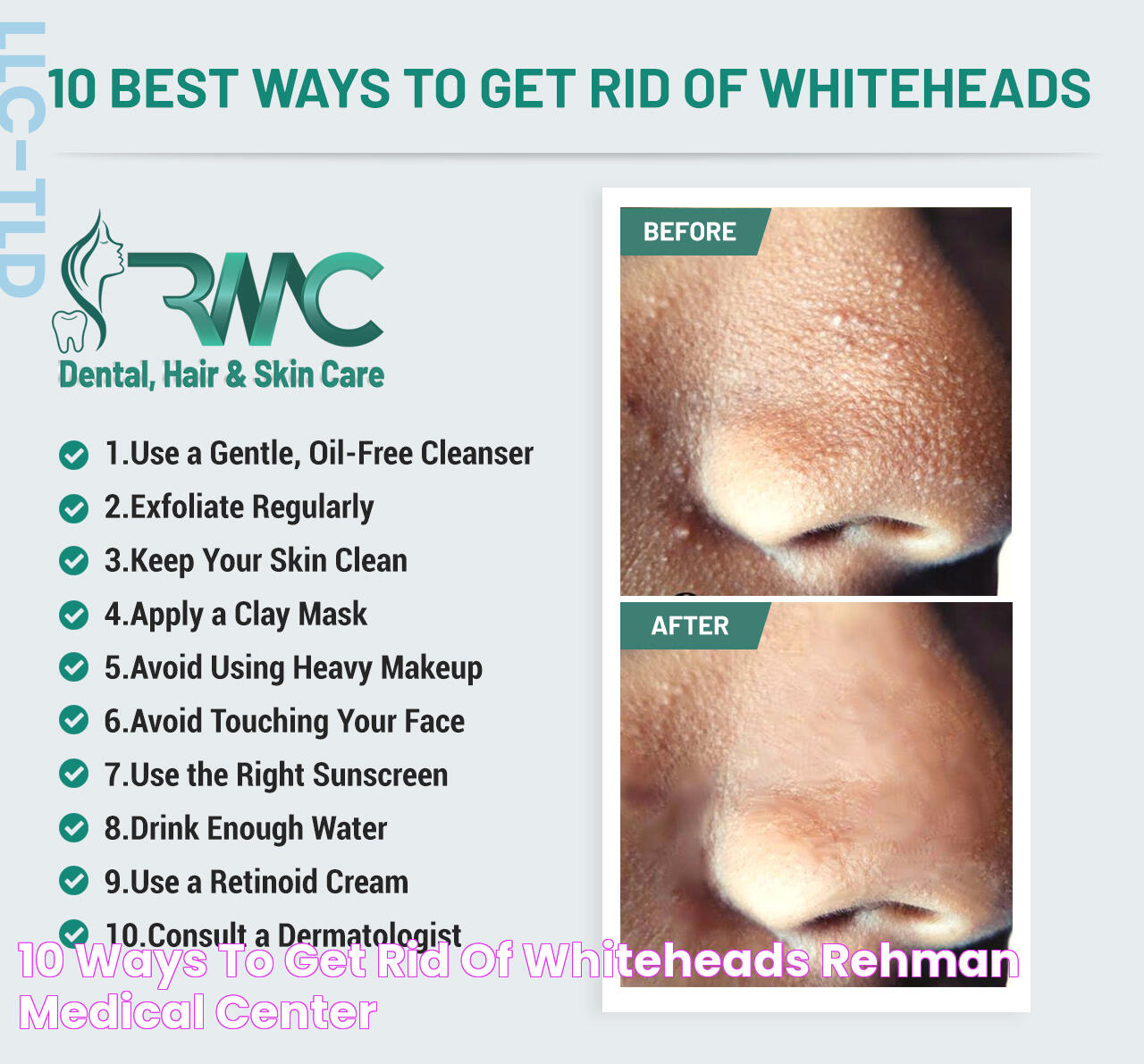Whiteheads are small, white bumps that appear on the skin due to clogged pores. They are a type of acne that can affect anyone, regardless of age or gender. These pesky blemishes often appear on the face, particularly around the nose, forehead, and chin, but they can also occur on the chest, back, and shoulders. Understanding how to get rid of whiteheads is essential for maintaining healthy, clear skin.
The formation of whiteheads begins when dead skin cells, oil, and bacteria become trapped in hair follicles, leading to a clogged pore. Unlike blackheads, which are open and exposed to air, whiteheads remain closed, making them harder to treat. While they are not usually painful, whiteheads can be unsightly and may cause distress if they appear in noticeable areas.
Fortunately, several effective methods can help you manage and eliminate whiteheads, promoting a clearer and healthier complexion. From adopting a consistent skincare routine to utilizing over-the-counter treatments and natural remedies, there are numerous strategies to explore. This article will delve into these methods, providing detailed guidance on how to get rid of whiteheads and achieve the radiant skin you desire.
Read also:Timeless Elegance Of Mac Russian Red Lipstick The Ultimate Lip Color
Table of Contents
- What Causes Whiteheads?
- How to Identify Whiteheads on Your Skin?
- The Importance of a Skincare Routine
- What Products Can Help Remove Whiteheads?
- Natural Remedies for Whitehead Removal
- Should You Pop Whiteheads?
- How Does Diet Affect Whitehead Formation?
- Professional Treatments for Stubborn Whiteheads
- Can Lifestyle Changes Reduce Whiteheads?
- How to Prevent Whiteheads in the Future?
- Frequently Asked Questions
- Conclusion
What Causes Whiteheads?
Understanding the root causes of whiteheads is crucial for effective treatment. Whiteheads form when dead skin cells, oil (sebum), and bacteria clog hair follicles. This blockage leads to the formation of a small, closed bump on the skin's surface. Several factors contribute to this process:
- Hormonal fluctuations: Hormones, particularly androgens, increase sebum production, leading to clogged pores.
- Poor skincare habits: Inadequate cleansing, over-exfoliating, or using harsh products can irritate the skin, exacerbating whitehead formation.
- Diet: Consuming high-glycemic foods or dairy products may contribute to acne, including whiteheads.
- Genetics: A family history of acne can increase susceptibility to whiteheads.
- Environmental factors: Pollution, humidity, and exposure to irritants can worsen whitehead development.
How to Identify Whiteheads on Your Skin?
Whiteheads are a common type of acne, but identifying them correctly is essential for proper treatment. They typically appear as small, round, white bumps on the skin's surface. Here are some characteristics to help you spot whiteheads:
- Size: Whiteheads are usually small, about 1-2 millimeters in diameter.
- Color: The white or flesh-colored appearance distinguishes them from other types of acne.
- Texture: They feel firm and closed when touched, unlike blackheads, which have a rough texture.
- Location: Commonly found on the T-zone (forehead, nose, chin) but can also appear on the chest, back, and shoulders.
Recognizing these signs will help you differentiate whiteheads from other skin issues, allowing you to choose the most effective treatment.
The Importance of a Skincare Routine
A consistent skincare routine is vital for preventing and treating whiteheads. Proper skincare helps maintain a clean, balanced complexion, reducing the likelihood of clogged pores. Here are some essential steps to incorporate into your daily routine:
- Cleansing: Use a gentle cleanser twice daily to remove impurities, oil, and makeup.
- Exfoliating: Exfoliate 2-3 times a week to remove dead skin cells that can contribute to clogged pores. Look for products with salicylic acid or glycolic acid.
- Moisturizing: Choose a non-comedogenic moisturizer to hydrate the skin without clogging pores.
- Sun protection: Apply a broad-spectrum sunscreen daily to protect against UV damage and prevent acne scars.
- Spot treatment: Use targeted treatments containing benzoyl peroxide or retinoids to address individual whiteheads.
Consistency is key to achieving and maintaining clear skin, so stick to your routine even after whiteheads have cleared.
What Products Can Help Remove Whiteheads?
Several over-the-counter products can effectively target whiteheads and promote clearer skin. Here are some key ingredients to look for:
Read also:Chic Nail Art French Tips With Pink Hearts
- Salicylic acid: This beta hydroxy acid penetrates the pores, helping to dissolve oil and dead skin cells.
- Benzoyl peroxide: This antibacterial agent reduces bacteria on the skin's surface, decreasing inflammation.
- Retinoids: Derived from vitamin A, retinoids improve cell turnover and prevent clogged pores.
- Alpha hydroxy acids (AHAs): Glycolic and lactic acids exfoliate the skin, promoting a smoother texture.
- Clay masks: These masks draw out impurities and excess oil, helping to prevent whiteheads.
When selecting products, consider your skin type and any sensitivities you may have. Start with lower concentrations to minimize irritation and gradually increase as your skin adjusts.
Natural Remedies for Whitehead Removal
For those who prefer natural alternatives, several home remedies can help manage whiteheads. While their effectiveness varies, they are generally gentle on the skin. Here are some popular options:
- Tea tree oil: Known for its antimicrobial properties, tea tree oil can reduce bacteria and inflammation. Dilute with a carrier oil before applying to the skin.
- Aloe vera: This soothing plant extract can calm irritated skin and promote healing.
- Honey: With its antibacterial and moisturizing properties, honey can help unclog pores and nourish the skin.
- Apple cider vinegar: Its acidic nature can balance the skin's pH and exfoliate dead skin cells. Dilute with water and use as a toner.
- Witch hazel: This natural astringent can tighten pores and reduce oiliness.
While natural remedies can be effective, it's essential to patch-test new ingredients to avoid allergic reactions.
Should You Pop Whiteheads?
While it might be tempting to pop whiteheads, doing so can lead to more harm than good. Here are some reasons to avoid popping whiteheads:
- Scarring: Squeezing whiteheads can damage the skin, leading to permanent scars.
- Infection: Popping can introduce bacteria into the pore, worsening acne and causing infection.
- Inflammation: Manipulating the skin can increase redness and swelling, making the whitehead more noticeable.
If you feel compelled to pop a whitehead, it's best to seek professional help from a dermatologist who can safely extract it without causing damage.
How Does Diet Affect Whitehead Formation?
Diet plays a significant role in overall skin health, and certain foods can influence whitehead formation. Here are some dietary factors to consider:
- High-glycemic foods: Foods like white bread, sugary snacks, and processed cereals can spike blood sugar levels, increasing sebum production.
- Dairy products: Milk and cheese contain hormones that may trigger acne in some individuals.
- Omega-3 fatty acids: Found in fish, nuts, and seeds, these healthy fats can reduce inflammation and improve skin health.
- Antioxidant-rich foods: Fruits and vegetables high in vitamins A, C, and E can promote clear skin.
Consider keeping a food diary to identify any dietary triggers and make adjustments to support healthier skin.
Professional Treatments for Stubborn Whiteheads
For persistent whiteheads that don't respond to home treatments, professional interventions may be necessary. Here are some options to explore:
- Chemical peels: These treatments use acids to exfoliate the skin, removing dead cells and reducing whiteheads.
- Microdermabrasion: A non-invasive procedure that exfoliates the skin's surface, improving texture and clarity.
- Laser therapy: Targets and reduces acne-causing bacteria, promoting clearer skin.
- Prescription medications: Dermatologists may prescribe topical or oral treatments for severe acne.
Consult with a dermatologist to determine the most suitable treatment for your skin type and concerns.
Can Lifestyle Changes Reduce Whiteheads?
Adopting healthy lifestyle habits can have a positive impact on your skin, reducing the occurrence of whiteheads. Consider the following changes:
- Stress management: Practice relaxation techniques like yoga or meditation to reduce stress-related breakouts.
- Regular exercise: Physical activity improves circulation and promotes healthy skin.
- Hydration: Drinking plenty of water supports skin health and detoxification.
- Adequate sleep: Restful sleep allows the skin to repair and regenerate.
Incorporating these habits into your routine can enhance your overall well-being and contribute to clearer skin.
How to Prevent Whiteheads in the Future?
Prevention is key when it comes to managing whiteheads. Here are some strategies to keep your skin clear:
- Consistent skincare: Maintain a regular routine to keep pores clean and unclogged.
- Choose non-comedogenic products: Opt for cosmetics and skincare that won't block pores.
- Clean makeup tools: Regularly wash brushes and sponges to prevent bacteria buildup.
- Avoid touching your face: Limit contact to reduce the transfer of dirt and oil.
By following these preventive measures, you can minimize whitehead formation and enjoy a healthier complexion.
Frequently Asked Questions
What are the best products for treating whiteheads?
Look for products containing salicylic acid, benzoyl peroxide, or retinoids, as they effectively target whiteheads and promote clearer skin.
Is it safe to use home remedies for whiteheads?
Yes, many natural remedies like tea tree oil and aloe vera are safe, but always patch-test to avoid allergic reactions.
Can whiteheads be a sign of an underlying health issue?
While whiteheads are usually not a serious health concern, persistent acne may warrant a consultation with a dermatologist.
How long does it take to see results from whitehead treatments?
Results vary depending on the treatment, but consistent use of skincare products and home remedies may show improvements within a few weeks.
Are professional treatments necessary for whiteheads?
For stubborn or severe whiteheads, professional treatments like chemical peels or laser therapy may be beneficial.
Can hormonal changes affect whitehead formation?
Yes, hormonal fluctuations, especially during puberty or menstrual cycles, can increase sebum production and lead to whiteheads.
Conclusion
Whiteheads can be a frustrating skin concern, but with the right approach, they can be effectively managed and prevented. By understanding the causes of whiteheads and implementing a consistent skincare routine, along with dietary and lifestyle adjustments, you can achieve clearer, healthier skin. Whether you choose over-the-counter products, natural remedies, or seek professional treatments, there are numerous options available to suit your needs. Remember, patience and persistence are key, and with time, you can enjoy a radiant complexion free from whiteheads.
For more information on skincare and acne treatments, consider visiting reputable dermatological websites or consulting with a licensed dermatologist.

